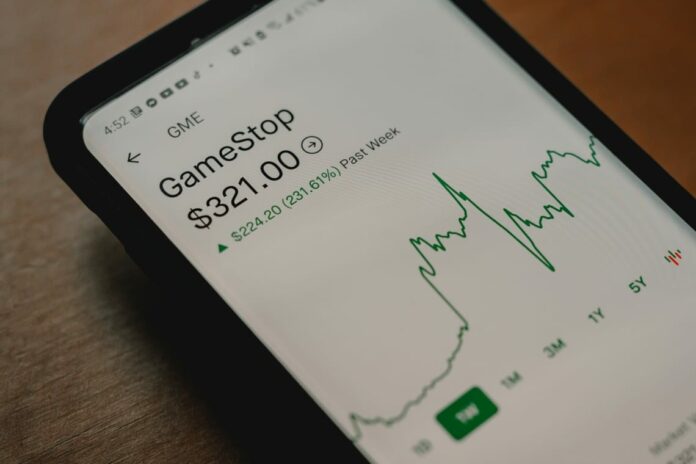The trading platform Robinhood has had several problems with the GameStop stock.
It all started in January 2021, at the height of the bull run, when it helped thousands of amateur speculators artificially raise the price of those shares.
Robinhood was not the cause of the problem, but it did in fact unintentionally help the bubble inflate.
Summary
The bubble on GameStop stock and the Robinhood case
By early January 2021, GameStop’s stock price was below $5.
Within only twenty days it had skyrocketed to over $120, setting a new all-time high.
Previously, the highest price ever reached had been $16 in December 2007, and since January 2014 it had triggered a long period of decline that ended below $5 in early 2021.
By February 2021 the price had collapsed below $10, although then over the following months it had recovered above $85.
The bubble then finally burst starting in June of that year, with the price returning first to $30 and then also below $20.
During 2023, the price seems to have stabilized more or less around $20, which is higher than at the 2007 peak, and still well above the $5 from which the last big bull run started.
As early as February 2021 Robinhood was called to testify before the US Congressional House Committee on Financial Services on this bubble in order to establish what its role had been.
On top of that, the current GameStop stock price may still be elevated, and it is not unthinkable that it could return to that $10 touched in February 2021 during the first phase of the bubble burst.
The charges against Robinhood
In July of the same year (2021), the US Financial Services Regulatory Authority (FINRA) fined Robinhood nearly $70 million for a series of negligences regarding the protection of its users.
Even though Gamestop was not specifically mentioned in the reasons supporting this sanction, it is very likely that it played some kind of role in this affair.
The point is precisely the consequences on users’ investments or speculations of the behavior held by the platform, since many have lost money.
Indeed, in September 2021, 16 investors filed a class action lawsuit against the trading platform, alleging that Robinhood prevented them from buying meme stocks in January 2021, while the hedge funds were liquidated.
In this specific case, the allegation is that Robinhood prevented the purchase of Gamestop stock precisely while the buying campaign was underway, organized mainly via Reddit to drive up the price so as to liquidate the hedge funds’ short positions.
The charge was that of market manipulation.
Truth be told, the decision to suspend trading had been made by the platform precisely because of the strong market manipulation organized via Reddit.
Robinhood’s victory
In light of all this, it is not surprising that in the end the appeals court agreed with Robinhood.
In Judge Britt Grant’s ruling, the class action was effectively dismissed because, according to the judge, the plaintiffs’ arguments lacked legal merit.
In fact, the judge wrote in black and white that Robinhood had the right to do exactly what it did, because it was not legally obligated to protect investors from any losses.
The judge also reiterated that in cases like these the platform is legally entitled both to restrict its customers’ ability to trade securities and to refuse to execute transactions.
This is a bit like Judge Grant saying that the plaintiffs’ allegations are false because he found nothing wrong with the platform’s actions in that specific context.
Theoretically, the plaintiffs could appeal to the Supreme Court, but right now that seems a difficult route to take.
In cases like these it is often much easier to lose than to gain, so it is not at all surprising that there are those who lost out in an attempt to exploit that pump-and-dump campaign. Indeed, even if the campaign was organized only to generate the pump, in such cases the subsequent dump is virtually inevitable.
Nor should it be surprising that attempts such as these are blocked, or at any rate limited, because they generally serve to make money primarily for those who organize them, almost always at the expense of those who enter later.




